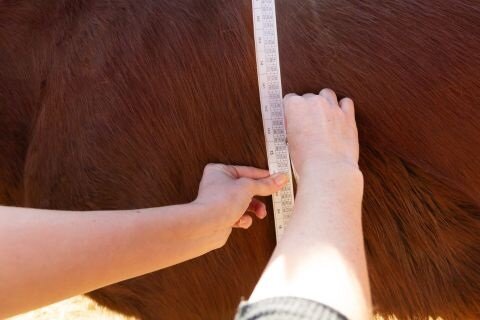
Many horse owners have encountered horses known as “easy keepers.” These are horses that tend to have a slower metabolism and tend to be a bit on the heavier side. Just as with humans, carrying extra weight can lead to health complications. If you have an easy keeper horse, you’ll need to pay close attention to your animal and what they’re eating to ensure they’re getting the optimal amount.
One of the biggest challenges to raising horses is ensuring they’re properly cared for. Managing an easy keeper requires a combination of careful diet, regular exercise, and attentive care to ensure their well-being. With a clear understanding of healthy horse weight, you can carefully tailor your feed to each animal’s needs.
One of the key factors in managing an easy keeper is their diet. It’s crucial to provide them with a balanced and nutritious diet that meets their energy needs without causing excessive weight gain. This means selecting high-fiber, low-calorie forage for horses, such as grass hay, and limiting their intake of rich grains and high-calorie supplements. Monitoring their calorie intake is essential; consulting with a veterinarian or equine nutritionist can help you create a customized feeding plan tailored to your horse’s specific needs.
Regular exercise is another essential component in managing an easy keeper. Exercise helps burn calories, improve muscle tone, and enhance overall fitness. However, it’s important to start slowly, especially if your horse has been relatively sedentary. Begin with light, low-impact activities such as walking and gradually increase the intensity and duration as your horse’s fitness level improves. Engaging in regular exercise not only aids in weight management but also promotes mental stimulation and reduces the risk of obesity-related health issues.
In addition to diet and exercise, providing mental and emotional stimulation is vital for your easy keeper’s well-being. Enrich their environment with social interaction, toys, and regular turnout in a pasture or paddock. Mental stimulation can prevent boredom, reducing the likelihood of overeating from stress or anxiety.
Regular veterinary checkups are fundamental for monitoring your horse’s weight and overall health. Your vet can help you assess your horse’s body condition score (BCS) and recommend adjustments to their diet and exercise routine if needed. Monitoring their weight regularly allows you to make timely changes to their management plan, ensuring they stay in optimal health.
Lastly, remember that managing an easy keeper requires patience and consistency. It might take time to find the right balance of diet and exercise that works for your horse. Stay committed to their well-being, and with proper care, your easy keeper can lead a healthy, happy life. By understanding their unique needs and providing the necessary support, you can help your easy keeper maintain an ideal weight and enjoy a good quality of life for years to come.
Raising horses doesn’t have to be complicated. Those who want to maintain horse weight in a responsible manner should consider the basics of easy keeper horse care.




